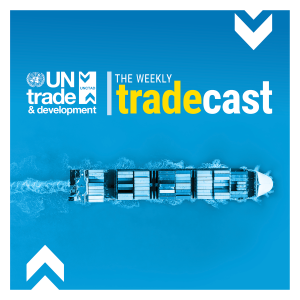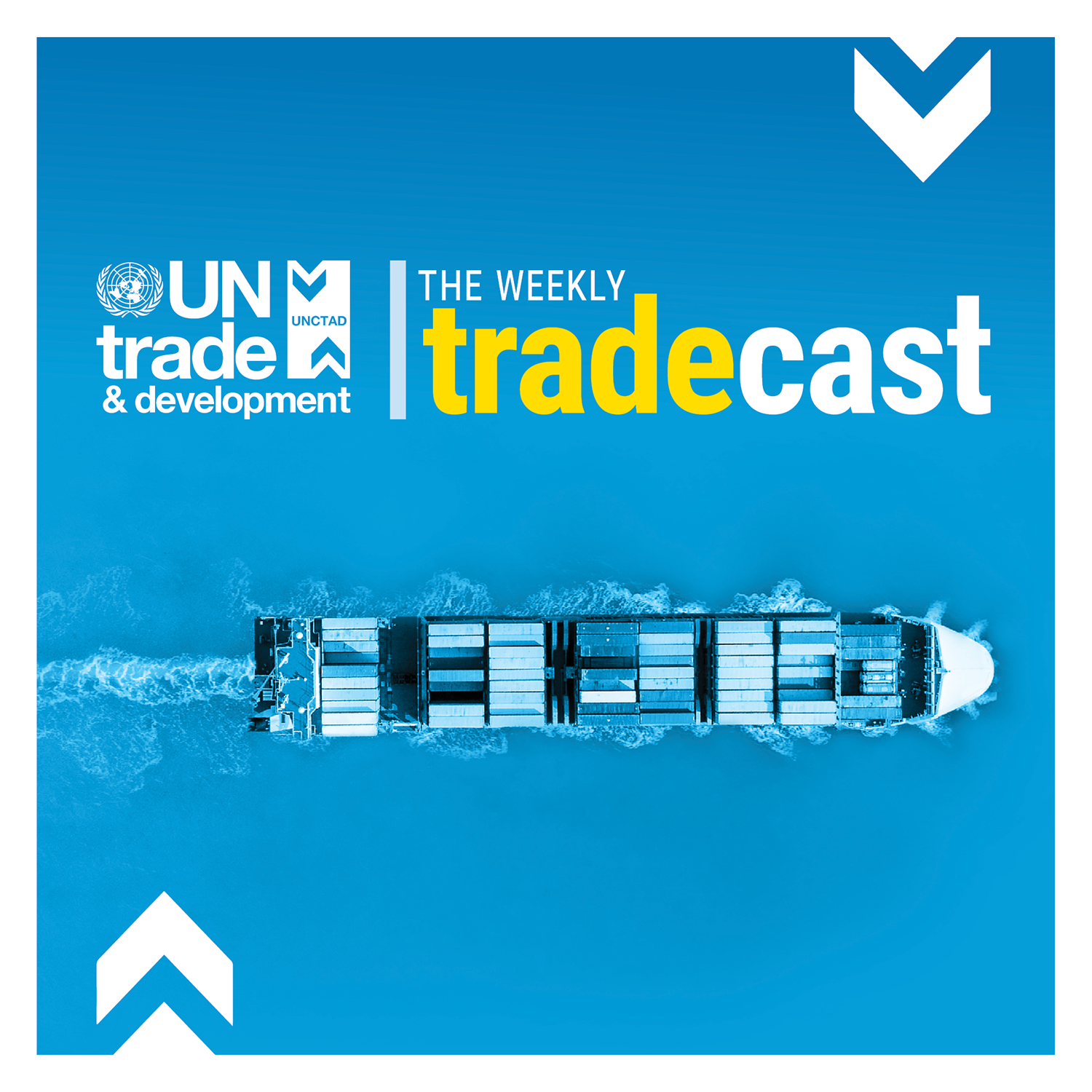Episodes
Episodes



Thursday Dec 08, 2022
Thursday Dec 08, 2022
This episode of the Weekly Tradecast looks at the impact of higher interest rates, rising inflation and a strong dollar on developing countries with Miho Shirotori, head of UNCTAD’s trading systems, services and creative economy branch.
As countries emerged from COVID-19 lockdowns, the soaring demand for goods overwhelmed supply chains and transportation. The war in Ukraine brought fresh turmoil, along with even more expensive food and energy.
With inflation running high, central banks have raised interest rates sharply and rapidly. The US dollar has also strengthened against other currencies as investors seek a safe place in times of trouble.
For developing countries, this combination is a disaster. With crisis after crisis, what can be done to help them cope?
Tune in to UNCTAD’s Miho Shirotori to find out how we can protect developing countries and the global development goals.



Thursday Dec 01, 2022
22. Currency Chaos: Cost of living crisis gets worse as US dollar surges
Thursday Dec 01, 2022
Thursday Dec 01, 2022
This episode of the Weekly Tradecast talks to UNCTAD senior economist Penelope Hawkins about the sharp rise of the US dollar – and its effects on economies and people.
With inflation soaring, the rapid rises in United States interest rates and a healthy US economy have prompted investors to flood to the dollar as a safe place in times of trouble. As the dollar surges in value, other currencies are being pushed to weaker lows.
Many developing countries are even worse off as they find it harder to borrow and struggle with mountains of debt. With uncertainty running high, weaker currencies make food and other imports even more expensive during the global cost-of-living crisis.
Will this raise the risk of investors pulling money and what does it mean for countries that rely on funding for development? Tune in to UNCTAD’s Penelope Hawkins to find out.



Thursday Nov 24, 2022
21. Environmental costs: Who should pay to fix climate change?
Thursday Nov 24, 2022
Thursday Nov 24, 2022
This episode of The Weekly Tradecast looks at who should pay to fix the damage from climate change with Katie Gallogly-Swan from UNCTAD’s globalization and development strategies division.
At the recent COP 27 climate summit, world leaders agreed to set up a "loss and damage" fund to support developing countries hit the worst by storms and drought as the planet heats up.
But the big question about who should pay was left unanswered. Money has long been a sticking point – along with making good on existing commitments.
A decade ago, the world’s most industrialized countries pledged to mobilize $100 billion every year by 2020 to help developing countries move to cleaner energy and protect themselves against more intense heat waves and floods as the planet warms.
So far, those promises have not been met. Is the advanced world failing to meet its climate finance commitments? Tune in to UNCTAD’s Katie Gallogly-Swan to find out.



Thursday Nov 17, 2022
20. Unhealthy interest: How high can rates go?
Thursday Nov 17, 2022
Thursday Nov 17, 2022
This episode of the Weekly Tradecast talks about central banks raising interest rates to tackle soaring inflation with Anastasia Nesvetailova, head of UNCTAD's macroeconomic and development policies branch.
Prices of food, energy and most other things have been rising sharply. Part of that is the impact of the war in Ukraine and part is a rise in consumer spending as COVID-19 restrictions ease.
By raising rates, central banks seek to control inflation by making it more expensive to borrow money. But it's a tough balancing act – especially in a tough economy. Higher rates on mortgages and loans tend to hurt consumers and businesses, raising the risks of slower economic growth and recession.
How high will rates go and how bad could the impact be? Listen to UNCTAD’s Anastasia Nesvetailova to find out.



Thursday Nov 10, 2022
19. Not fantastic when it’s plastic: Stemming the tide of ocean rubbish
Thursday Nov 10, 2022
Thursday Nov 10, 2022
In this episode of The Weekly Tradecast, as the COP27 global climate summit gets underway, we look at plastic pollution and how the world is drowning in it with David Vivas, an UNCTAD legal officer working on trade and environmental issues.
At least 10 million tonnes of plastic end up in our ocean every year. The bags, bottles and food wrappers that we use for just a short time can take many decades to break down.
In the meantime, millions of animals are killed by plastic pollution each year as they get entangled or strangled. And microplastics have been found in many marine creatures – including ones that we eat.
Listen to the episode to find out.



Thursday Nov 03, 2022
18. Bearing the brunt: Why least developed countries need more climate help
Thursday Nov 03, 2022
Thursday Nov 03, 2022
Just ahead of the COP27 climate summit, UNCTAD's Weekly Tradecast looks at why developing nations suffer the most from climate change and need the most help to adapt, with Paul Akiwumi, UNCTAD’s director for Africa and least developed countries.
The world’s 46 least developed countries, or LDCs, are home to more than one billion people but account for just 4% of global greenhouse gas emissions. Yet they bear the brunt of climate change with more destructive storms, floods and heatwaves.
This week, UNCTAD released its annual report on LDCs, focusing this year on the low-carbon transition. These countries are the litmus test, it says, for international climate efforts.
With support from advanced countries falling short, tune in to find out why a reboot is needed to ensure a just low-carbon transition for the world’s most vulnerable countries.



Thursday Oct 27, 2022
17. Sea of trouble: Turning our ships green
Thursday Oct 27, 2022
Thursday Oct 27, 2022
In the run-up to the COP 27 global climate summit, The Weekly Tradecast looks at why ships and ports must drastically cut greenhouse gas emissions with Jan Hoffmann, head of trade logistics at UNCTAD.
The shipping industry is vital to the global economy – over 80% of all traded goods move by sea – but there's a big downside for the environment.
As their massive engines churn, cargo ships produce as much carbon dioxide every year as the whole of Japan. That has to change to stay in line with the Paris climate agreement’s 1.5C global heating target.
Tune in to find out how the shipping sector can transform to reduce emissions and help protect the planet.



Thursday Oct 20, 2022
16. Energy dilemma: Fossil fuels versus renewables in a time of crisis
Thursday Oct 20, 2022
Thursday Oct 20, 2022
This episode of The Weekly Tradecast talks about the energy crisis and alternatives to get beyond it with Henrique Pacini, an UNCTAD economist specializing in trade, energy and the environment.
The war in Ukraine has tightened supplies of oil and gas, driving up prices and uncertainty just as demand recovers with the easing of COVID-19 restrictions.
Western nations are phasing out Russian fuel but scrambling to secure energy from elsewhere to keep factories running and prepare for winter.
Will the energy crisis push countries into postponing climate goals and investments in cleaner renewable energy? Tune in to Henrique to find out.






